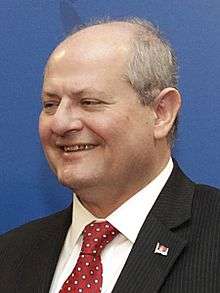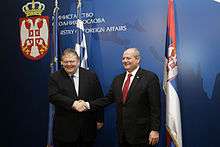Ivan Mrkić
| Ivan Mrkić | |
|---|---|
 | |
| Minister of Foreign Affairs of Serbia | |
|
In office 27 July 2012 – 27 April 2014 | |
| President | Tomislav Nikolić |
| Prime Minister | Ivica Dačić |
| Preceded by | Vuk Jeremić |
| Succeeded by | Ivica Dačić |
| Ambassador to Japan | |
|
In office 2006–2011 | |
| Preceded by | Predrag Filipov |
| Succeeded by | Bojana Adamović Dragović |
| Personal details | |
| Born |
30 May 1953 Belgrade, Yugoslavia |
| Nationality | Serbian |
| Spouse(s) | Ivana Mrkić |
| Children | 2 |
| Residence | Belgrade, Serbia |
| Alma mater | University of Belgrade Faculty of Law |
| Website | Official biography |
Ivan Mrkić (Serbian Cyrillic: Иван Мркић, pronounced [ǐʋan mr̂kitɕ], born 30 May 1953) is a Serbian diplomat and the former Minister of Foreign Affairs.
Early life and education
Mrkić was born in Belgrade, Serbia, Yugoslavia, where he finished his elementary and secondary education. He graduated from the University of Belgrade Faculty of Law in 1977.[1] He also speaks English and French.
Professional career
Mrkić started his diplomatic career soon after graduation, with a job at the Federal Ministry for Foreign Affairs of Yugoslavia.[2]
Between 1979 and 1982, Mrkić worked as a clerk in the Administration of International Relations of the Federal Ministry for Foreign Affairs. He attended a United Nations Disarmament Fellowship in Geneva, Vienna, New York, and Boston. He continued on in the roles of counselor, then Assistant Chief of the Division of Multilateral Activities. He was also a participant in United Nations General Assembly sessions, as well as in the delegation at the Ninth Conference of the Non Aligned Movement in Belgrade in 2012.
Mrkić continued his diplomatic service in Brussels, where he served as the Minister Counselor for the Yugoslav mission to the European Community between 1990 and 1992. During that period, he participated in the work of the Conference on the former Yugoslavia in the Hague and Brussels.
From 1992-93, Mrkić served as Chief of the Cabinet under Dobrica Ćosić, the first President of the Federal Republic of Yugoslavia.[3]
In 1993, Mrkić was appointed to the office of the Yugoslav Embassy's chargé d'affaires in Cyprus, after which he became the Yugoslav Ambassador in Nicosia, Cyprus, where he remained until 1999.[4] He shifted into an ambassadorial role as the Ministry of Foreign Affairs in Belgrade, and became Deputy Head for Bilateral Affairs in 2000. In 2001, he accepted an appointment as Head of Bilateral Relations and Assistant to the Federal Minister of Foreign Affairs. Starting in 2004, Mrkić joined a group of ambassadors for special and ad hoc duties in the Ministry of Foreign Affairs of the then Serbia and Montenegro.
In 2005, he served as President of the National Commission for the Implementation of the Chemical Weapons Convention, appointed by the Council of Ministers of Serbia and Montenegro. In 2006, Ivan Mrkić was appointed as Ambassador of the Republic of Serbia to Tokyo, Japan, where he served his diplomatic tenure until 2011.[5]
After completing his service in Japan in 2011, Mrkić was appointed State Secretary in the Ministry of Foreign Affairs of Serbia[6] under his predecessor Vuk Jeremić, where he stayed until his appointment as Minister of Foreign Affairs.[7]
Minister of Foreign Affairs

On 27 July 2012, Mrkić was appointed as the Serbian Minister of Foreign Affairs in the cabinet of Prime Minister Ivica Dačić.[8] He was appointed as a career diplomat and independent candidate, not aligned with any party,[9] but was endorsed by Serbian Progressive Party.[10]
Immediately after his appointment, Mrkić acknowledged that there would be no changes in Serbia’s foreign policy. He explained that a foundation for foreign policy would remain, preserving territorial integrity and sovereignty, and that the priority would be fully-fledged European Union membership.[11]
"We know what our foundations and priorities are and we point out our pathway toward the EU membership and that is not any different than it was in the previous period." Mrkić gave this quote during an interview with Serbian Broadcaster B92. When asked about the future relations with Moscow and Washington, he said, "Serbia has exceptionally good relations with Russia while it wanted to deepen and improve the existing solid partnership with the U.S." When it came to regional cooperation and good neighborly relations, Mrkić stated, "I expect that there will be intensive communication with colleagues from the neighboring countries in the future period and that we will be seeing each other at numerous meetings."[12]
Personal life
Ivan Mrkić and his wife Ivana have two children.
References
- ↑ Official Biography from Serbian Ministry of Foreign Affairs Serbian Government; retrieved 30 July 2012.
- ↑ Ko je Ivan Mrkić, kandidat za šefa srpske diplomatije Telegraf
- ↑ Bivši šef kabineta Dobrice Ćosića: Kandidat za šefa srbijanske diplomatije Ivan Mrkić, 24sata.info; accessed 21 August 2015.
- ↑ Ivan Mrkić Takes Over as Foreign Minister, beta-press.coml accessed 21 August 2015.
- ↑ "Kofere pakuje 10 ambasadora", novosti.rs; accessed 21 August 2015.(Serbian)
- ↑ Article by Ivan Mrkić, State Secretary of the Ministry of Foreign Affairs, Serbia, rcc.int (Regional Cooperation Council, Newsletter 21/2012 - Our South East Europe); accessed 21 August 2015.
- ↑ New FM takes over office from Jeremić, b92.net; accessed 21 August 2015.
- ↑ Serbia`s new government elects Ivan Mrkić foreign minister Balkan Open Report
- ↑ Ivan Mrkić – profesionalni diplomata na čelu MIP, Politika.rs; accessed 23 August 2015.
- ↑ Mrkić - diplomat with a long career, Tanjug.rs; accessed 23 August 2015.
- ↑ Mrkić: No change in course, EU main goal, Tanjug.rs; accessed 23 August 2015.
- ↑ FM: No changes in Serbia's foreign policy, B92.net; accessed 23 August 2015.
External links
| Wikimedia Commons has media related to Ivan Mrkić. |
| Government offices | ||
|---|---|---|
| Preceded by Vuk Jeremić |
Minister of Foreign Affairs of Serbia 2012-2014 |
Succeeded by Ivica Dačić |